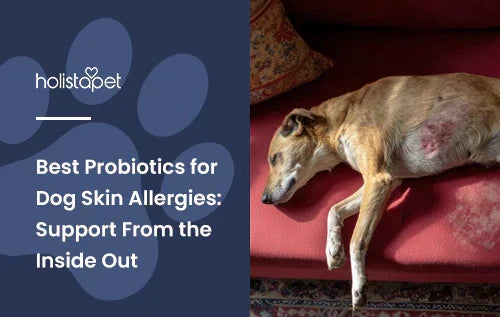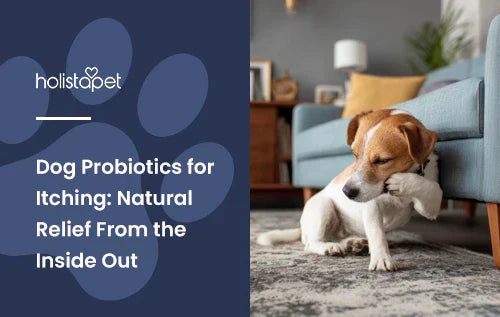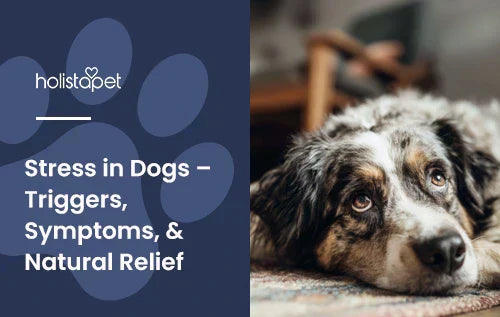Irritated skin doesn't have to steal your pup's joy. The best probiotics for dog skin allergies work inside the gut, bringing balance where it matters most. They feed good gut bacteria, keep the bad ones in check, and give your dog's immune system the support it needs to promote healthy skin.
With the right probiotic blend, many dogs with allergies can enjoy calmer skin and fewer flare-ups. Each chew or scoop is a simple step toward healthy skin, smooth digestion, and a goofy, slobbery smile that says they're feeling good again.
Understanding Skin Allergies in Dogs

Skin allergies happen when the immune system overreacts to something harmless, like pollen or certain foods. This can lead to irritated skin that may then cause redness, bumps, open wounds, and excessive licking, scratching, and chewing. Some canines may also show nervous or restless behaviors from all the scratching.
The triggers can change from dog to dog, but the result is often the same: skin that needs relief and a body that needs balance. Catching these issues early lets pet parents adjust their dog's diet or surroundings to help calm the skin and prevent future flare-ups.
Common Causes of Canine Skin Allergies
Pups can react to many different triggers. Some come from their food, some from environmental factors, and some from pests that latch on. Knowing these common causes can help dog owners step in sooner:
- Food Allergies. Certain proteins, grains, or additives in food can cause itchy skin, stomach troubles, or both.
- Environmental Allergies. Pollen, mold, and dust mites can spark allergy symptoms all year round or during certain seasons.
- Flea Bites. Even one bite can lead to redness, puffiness, and nonstop scratching in sensitive pups.
- Contact Irritants. Shampoos, cleaners, or yard chemicals can cause irritation after touching the skin.
Symptoms That May Point to Gut Imbalance
A dog's skin can sometimes reflect what's going on inside their gut. When the balance of good bacteria shifts, the effects can appear both inside and out. Noticing these signs early can help you address skin and digestive issues together:
- Excessive Scratching. Itching that happens often and doesn't seem to stop.
- Skin Redness. Spots of irritated skin that look warm or swollen.
- Frequent Digestive Upset. Occasional loose stools, diarrhea, or gas.
- Hot Spots. Wet, irritated patches your dog licks or chews again and again.
- Dull Coat. Fur that loses its shine or feels rough to the touch.
- Lack of Energy – Lower activity levels or fatigue that may be tied to poor nutrient absorption.
- Weight Changes – Unexplained weight loss or weight gain despite no big diet changes.
- Poor Appetite – Loss of interest in food, or picky eating habits that weren’t there before.
How Gut Health Impacts Your Dog's Skin
A healthy gut supports not just your dog's digestive health but their skin, too. When the gut bacteria stay balanced, they help control immune reactions that can cause skin problems. This balance also keeps bad bacteria under control and supports the body's natural defenses.
Poor gut health can lead to swelling, redness, and other skin troubles. It can also weaken immune health, making allergy symptoms worse. Supporting your dog's gut health, therefore, gives them a better chance at smoother skin and a healthier coat.
Can Probiotics Help Dog Skin Allergies?
Yes. Probiotics can aid skin health by keeping a healthy balance of gut bacteria. A balanced gut microbiome plays a crucial role in how the immune system reacts to things that cause allergies. With more good bacteria and fewer bad bacteria, the body can handle triggers without overreacting.
For dogs with allergies, this can mean less scratching, fewer hot spots, and calmer skin overall. Probiotics also provide digestive support, which can improve how the body uses nutrients for skin repair and coat health. It's a no-fuss, natural way to help your furry friend's tummy, which supports their body.
What the Research Says
Studies show that some probiotic strains can help dogs with allergies by keeping the gut balanced and supporting the immune system. Probiotics work by keeping good bacteria strong and harmful bacteria in check, which can make the body less likely to overreact to allergens. A healthy gut microbiome has been linked to fewer allergy symptoms, like constant scratching or skin redness.
Research also points to better vitamin absorption and stronger skin in canines taking probiotics. These results give vets another natural way to help keep a dog's skin healthy.
Key Benefits of Probiotics for Allergic Dogs
Probiotics can be a good part of a dog's routine when they have allergies. By keeping the gut in balance, they can affect how the immune system reacts to things that cause itching or redness. This can mean fewer flare-ups and more comfort for your pup. Here are some awesome perks brought by regular probiotic intake:
- Balanced Gut Flora. Keeps good bacteria strong and pushes back bad bacteria.
- Improved Immune Response. Helps the body react the right way to allergy triggers.
- Better Nutrient Absorption. Makes sure the skin and coat get the vitamins they need.
- Reduced Digestive Discomfort. Can ease occasional gas or diarrhea from allergies.
What To Look for in Probiotics for Dog Skin Allergies
Choosing a suitable probiotic can make a big difference for dogs with allergies. The best options focus on gut health while also helping support the skin and coat. A few key features can help you find a product that fits your dog's specific needs:
- Strain Variety & Potency. A mix of strains with enough live microorganisms to be effective.
- Hypoallergenic, Clean Formulas. No fillers, artificial colors, or ingredients that may trigger allergies.
- Added Ingredients for Skin & Coat Health. Extras like omega fatty acids, vitamins, or fiber for extra skin support.
Best Probiotic Strains for Skin Allergies in Dogs
Some probiotic strains stand out for supporting both gut and skin health in dogs. Each one plays a role in keeping the gut balanced and helping the immune system respond in a healthier way. Including the right strains can make probiotics more effective for dogs with skin issues. Let's discuss these next:
- Lactobacillus Acidophilus
- Bifidobacterium Animalis
- Enterococcus Faecium
- Streptococcus Thermophilus
- Bifidobacterium Longum
- Lactobacillus Casei
- Lactobacillus Plantarum
- Lactobacillus Rhamnosus
Lactobacillus Acidophilus
Lactobacillus acidophilus is one of the best-known strains. It helps control bad bacteria in the gut while supporting the growth of beneficial bacteria. This balance helps calm the body's reaction to common allergens.
It is also linked to better digestion of dairy and plant-based foods, which can be helpful for dogs with sensitive stomachs. When digestion runs smoothly, the skin and coat often benefit, too.
Bifidobacterium Animalis
Bifidobacterium animalis is often used to help shorten bouts of loose stools or diarrhea. It works by supporting the gut lining, which helps block harmful bacteria from taking over. As this strain links to better stool quality, it can mean a healthier digestive system overall. Strong digestion helps the body get more from food, giving the skin the nutrients it needs to stay in good shape.
Enterococcus Faecium
Enterococcus faecium is known for its ability to work quickly in the gut. It can help restore balance after stress, travel, or a change in diet, which are times when stomach upset often appears. For allergy-prone dogs, this quick action may help reduce skin flare-ups that happen alongside stomach troubles. This strain is often found in vet-recommended formulas for pets with both gut and skin issues.
Streptococcus Thermophilus
Streptococcus thermophilus helps break down lactose and certain carbs, which can help ease stomach troubles in some sensitive canines. It also supports the production of compounds that protect the gut lining. By strengthening the gut barrier, these probiotic bacteria may lower the number of allergens that pass into the body and trigger skin reactions. This can mean calmer skin and less scratching over time.
Bifidobacterium Longum
Bifidobacterium longum has been studied for its role in helping ease nervous or upset behaviors in both people and animals. Stress can sometimes make allergy symptoms worse, so this calming effect may help affected dogs.
It also supports the immune system in reacting less strongly to triggers like pollen or dust mites. This can lead to fewer flare-ups and a more comfortable coat.
Lactobacillus Casei
Lactobacillus casei supports digestion by helping break down food into smaller, easier-to-absorb parts. This can be useful for pets that have trouble getting enough nutrients for skin repair.
It may also work alongside other probiotic strains to keep harmful bacteria in check. In a balanced gut, the immune system is less likely to overreact to harmless triggers.
Lactobacillus Plantarum
Lactobacillus plantarum is highly valued for its ability to stick to the gut lining, helping good bacteria stay in place. This strong attachment allows it to crowd out harmful bacteria more effectively.
It also produces natural compounds that can help reduce puffiness and redness in the skin. This makes it a good choice for dogs with allergy-related irritation.
Lactobacillus Rhamnosus
Lactobacillus rhamnosus has been studied for its role in supporting the body's response to seasonal allergies. It may help the immune system respond more calmly to pollen, dust, or other triggers.
It can also promote a more stable digestive system, which helps with nutrient use and overall skin health. For dogs with allergies, it's a strain worth looking for in a daily probiotic.
Signs Your Dog May Benefit From Probiotic Chews
Some dogs show clear signs that their gut and skin could use extra support. Probiotic chews can help bring balance back, which may improve both digestion and skin comfort. Watch for these common signs:
- Itchy Skin. Frequent scratching that doesn't seem to stop.
- Hot Spots & Excessive Licking. Irritated patches that your pup keeps licking or chewing.
- Frequent Digestive Upset. Occasional diarrhea, loose stools, or gas.
- Antibiotic Use. Past or current use of antibiotics can disrupt healthy gut bacteria.
Best Option: HolistaPet's Probiotics for Dogs With Skin Allergies

HolistaPet's Probiotics for Dogs Soft Chews are specially made to support digestion and skin comfort in dogs of all breeds and sizes. They help increase beneficial microorganisms in the gut, which can bring balance back to the digestive system.
These chews may also help calm itchy skin linked to allergies by supporting gut health and nutrient absorption. Each bag has 30 soft chews, making it easy to give your pup a daily dose. They're a simple way to support overall health and keep your furry friend feeling good.
Key Ingredients That Support Skin and Gut Balance
Each HolistaPet Probiotic Soft Chew contains 3 billion CFU (colony-forming units) from strains like L. acidophilus, L. casei, L. salivarius, L. plantarum, L. rhamnosus, L. brevis, Bifidobacterium bifidum, Streptococcus thermophilus, and B. lactis/longum. These strains work together to support digestion, immune function, and skin comfort.
The formula also includes pumpkin and sweet potato for fiber, vitamin C for skin and coat health, flax oil for fatty acids, nutritional yeast, safflower oil, and sunflower lecithin. This blend gives dogs both gut support and nutrients for healthy skin.
How Our Chews Compare to Other Brands
Compared to brands with fewer strains or lower potency, HolistaPet's Probiotic Soft Chews offer a richer mix of probiotics and added nutrients for complete support. Plus, we use only natural ingredients and avoid fillers or artificial additives.
Our chews are vegan-friendly, non-GMO, gluten-free, cruelty-free, and approved by vets. Each batch is third-party lab-tested for quality and safety. Many pet parents trust these yummy bites for daily gut and skin support. They're made to work for canines of all sizes and breeds, with a soft texture that's easy to eat.
How To Introduce Probiotics to Your Dog's Routine
Start by giving your dog the recommended amount prescribed by your vet or on the product label. For pups with sensitive stomachs, begin with a smaller dose and slowly increase it over several days. This gives their gut time to adjust.
Most dogs start to show changes in digestion or skin within a few weeks, but timing can vary. Give the chews at the same time each day for the best results. Consistency helps the probiotics build up in the gut and do their job.
Other Natural Ways To Support Dog Skin Health
Natural care can work well with probiotics to keep your canine companion's skin healthy and comfortable. A few simple additions to their routine can make a big difference in their skin and coat condition. You might want to try the following:
- Omega Fatty Acids and Anti-Inflammatory Foods. Omega fatty acids from fish oil or plant sources can help keep the skin soft and the coat shiny. They also help maintain the skin's natural barrier, which can help reduce dryness and irritation. Anti-inflammatory foods, like certain leafy greens or berries, provide antioxidants that protect skin cells from damage. As a top option, HolistaPet's Skin, Coat, & Nail Soft Chews include fish oil, aloe vera, ascorbic acid, and biotin for glowing skin, a smooth coat, and healthy nails.
- CBD for Soothing Irritation and Discomfort. CBD may help calm irritation and support overall comfort. It interacts with the body's endocannabinoid system (ECS), which plays a role in skin balance and immune function. This can help reduce redness and keep your pup feeling more at ease. HolistaPet offers broad-spectrum CBD oil, treats, chews, and capsules for dogs to promote calm and comfort. Ask your vet about it.
Frequently Asked Questions About Dog Probiotics & Skin Allergies
Dog owners often wonder about how probiotics work for skin allergies and what to expect. The right answers can make it easier to use them with confidence. In the next sections, we'll look at how long they take to work, safety concerns, and the best ways to give them year-round. We'll also cover whether you need a prescription and which form might be the best fit for your pooch.
How long do probiotics take to improve skin issues?
Many dogs show changes in skin comfort and coat condition within three to six weeks of daily probiotic intake. Some may react faster, while others may need more time. It depends on their overall health and the cause of their allergies.
Consistency matters here. Giving probiotics at the same time every day helps them build up in the gut and work more effectively. Sure, you might notice small changes early, but the best results come with steady, long-term use.
Can dogs have allergic reactions to probiotics?
Allergic reactions to probiotics are rare, but they can happen. Most probiotics for dogs use strains that are well-tolerated and safe for most pets.
Problems usually happen because of added ingredients like flavorings or fillers. So, choose a product with clean, simple ingredients to lower the chance of a bad reaction. If your pup shows signs like itching, swelling, or digestive issues after starting a probiotic product, stop giving it and talk to your vet.
Should I use probiotics year-round or just during allergy season?
You can give your dog probiotics year-round to keep their gut balanced and immune system supported. Daily use helps keep the levels of beneficial bacteria steady, which can be important for canines with frequent skin issues.
Some owners give probiotics only during allergy season to help with seasonal flare-ups. While this can help, year-round use usually delivers more consistent results for both gut and skin health.
Do I need a vet prescription for probiotic chews?
Most probiotic chews for dogs don't need a prescription. You can buy them online or at pet stores. Many brands, including HolistaPet, make formulas that are good for daily use and easy to give at home.
Even without a prescription, it's smart to check with your vet before starting a new supplement. They can help you choose the right probiotic strain, dose, and schedule for your pup's needs.
What’s better—powder, capsules, or chews?
For most pet parents, chews are the easiest choice for daily intake. They taste good, are simple to serve, and make dosing clear. Many dogs see them as a treat, so there's no struggle to get them to take it.
Powders and capsules can work well too, but they may be harder to give. You need to mix powders into food and hide capsules in treats. That's just extra work.
Final Thoughts: Best Probiotics for Skin Allergies in Dogs
Probiotics can be a simple way to support both gut and skin health in dogs with allergies. The right strains help balance gut bacteria, support the immune system, and may ease skin irritation.
HolistaPet's Probiotic Soft Chews offer a mix of proven strains with added nutrients for skin and coat health. They're easy to give, made with natural ingredients, and work for pups of all sizes. Adding them to your furry buddy's routine can help keep their skin calmer, their digestion smoother, and their tail wagging. Every scratch-free day becomes another reason for them to feel happy, healthy, and loved.


 CBD Oil for Dogs - Fast Acting
CBD Oil for Dogs - Fast Acting
 Chicken Flavored CBD Oil For Dogs - Easy Dose
Chicken Flavored CBD Oil For Dogs - Easy Dose
 Salmon Flavored CBD Oil For Dogs - Highly Rated
Salmon Flavored CBD Oil For Dogs - Highly Rated
 CBG Oil for Dogs and Cats - Loved by Thousands
CBG Oil for Dogs and Cats - Loved by Thousands





Leave a comment
All comments are moderated before being published.
This site is protected by hCaptcha and the hCaptcha Privacy Policy and Terms of Service apply.